NEW YORK (AP) — For decades, Jackie Young had been searching.
Orphaned as an infant, he spent the first few years of his life in a Nazi internment camp in what is now the Czech Republic. After World War II he was taken to England, adopted and given a new name.
As an adult, he struggled to learn of his origins and his family. He had some scant information about his birth mother, who died in a concentration camp. But about his father? Nothing. Just a blank space on a birth certificate.
That changed earlier this year when genealogists were able to use a DNA sample to help find a name — and some relatives he never knew he had.
Having that answer to a lifelong question has been “amazing,” said Young, now 80 and living in London. It “opened the door that I thought would never get opened.”
Now there’s an effort underway to bring that possibility to other Holocaust survivors and their children.
The New York-based Center for Jewish History is launching the DNA Reunion Project, offering DNA testing kits for free through an application on its website. For those who use the kits it is also offering a chance to get some guidance on next steps from the genealogists who worked with Young.
Those genealogists, Jennifer Mendelsohn and Adina Newman, have been doing this kind of work over the last several years, and run a Facebook group about Jewish DNA and genetic genealogy.
The advent of DNA technology has opened up a new world of possibilities in addition to the paper trails and archives that Holocaust survivors and their descendants have used to learn about family connections severed by genocide, Newman said.
“There are times when people are separated and they don’t even realize they’re separated. Maybe a name change occurred so they didn’t know to look for the other person,” she said. “There are cases that simply cannot be solved without DNA.”
While interest in genealogy and family trees is widespread, there’s a particular poignancy in doing this work in a community where so many family ties have been ripped apart because of the Holocaust, Mendelsohn said.
Her earliest effort in this arena was for her husband’s grandmother, who had lost her mother in a concentration camp. That effort led to aunts and cousins that no one in her husband’s family had known about.

